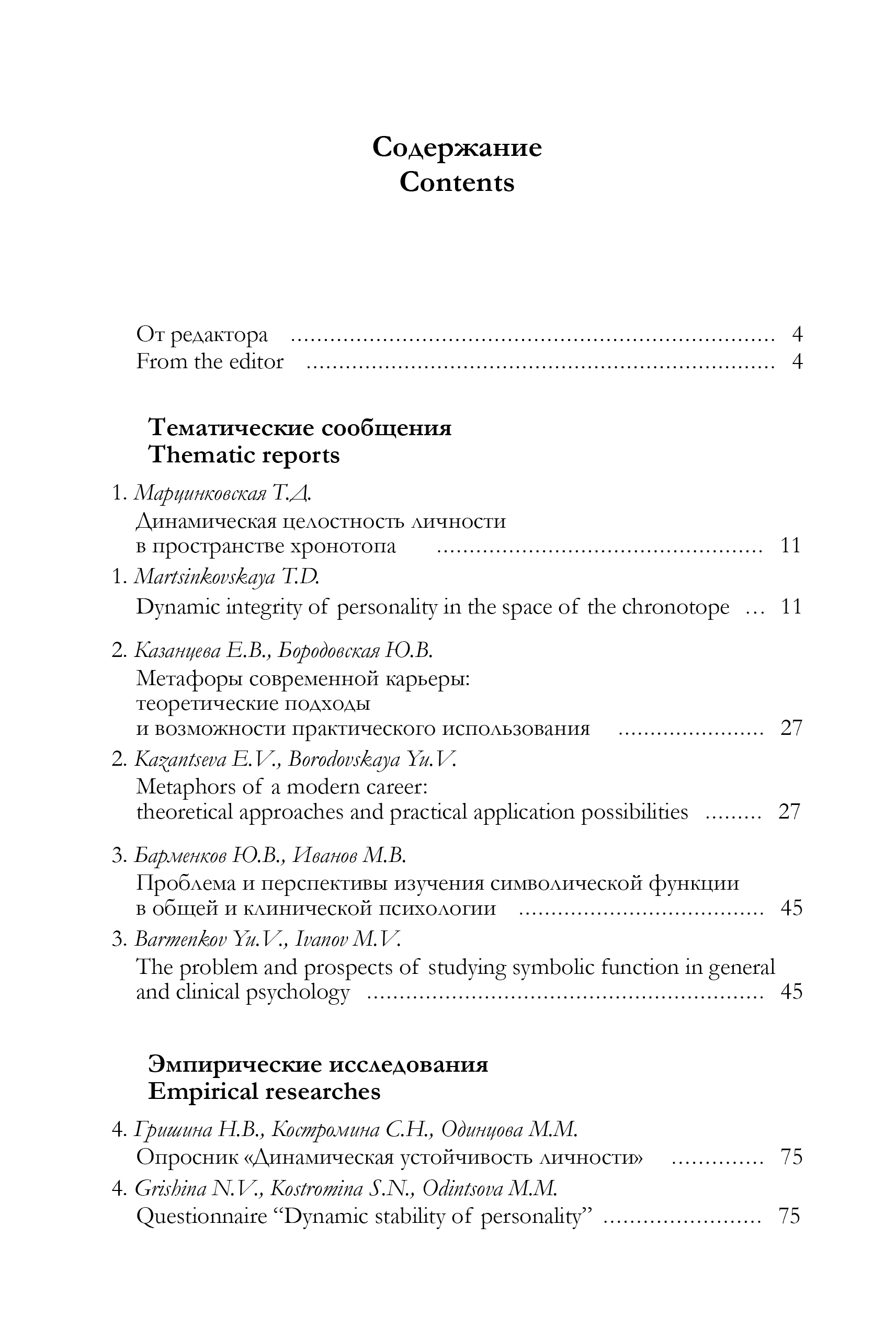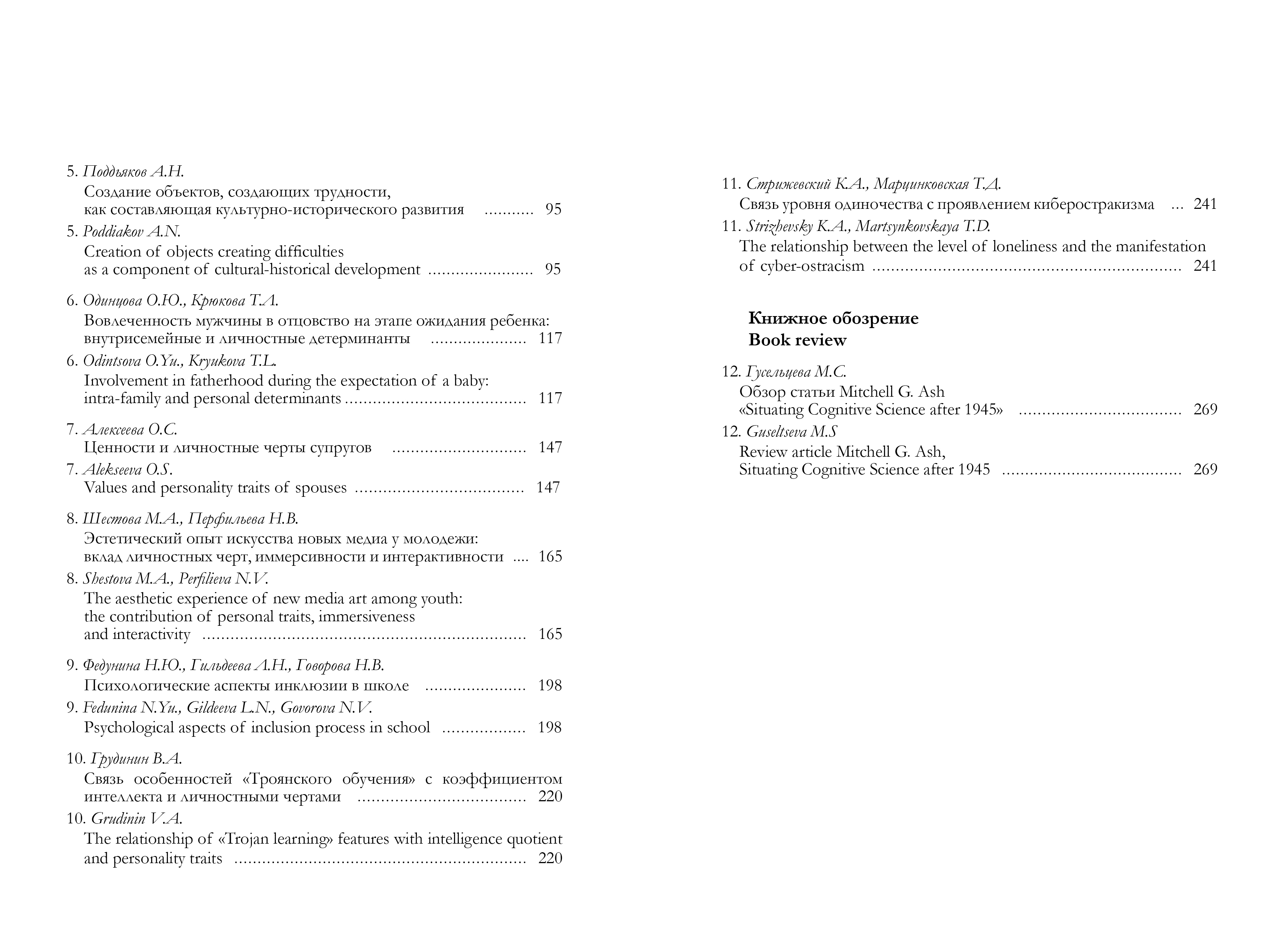From the Editor
Editor-in-chief of the journal «New psychological research» T. D. Martsinkovskaya, Moscow, 7 October 2024
Dear colleagues, I present the third issue of our journal. It is interesting because it combines theoretical and empirical articles devoted to similar problems.
The issue opens with the article by T.D. Martsinkovskaya "Dynamic integrity of personality in the space of the chronotope", which reveals the connection between the integrity of the psychological chronotope and the dynamic integrity of personality in a changing world. The factors that help harmonize the objective and subjective structures of space and time and, at the same time, support the unity of personal aspirations and meanings in a transitive society are revealed.
The theoretical analysis given in this article is closely related to the work of N.V. Grishina, S.N. Kostromina and M.M. Odintsova "Questionnaire "Dynamic stability of personality"". The article reveals the theoretical foundations of this questionnaire, as well as approaches to its development and validation. We hope that this questionnaire will be a significant and reliable instrument for studying the factors that ensure dynamic stability and integrity of the person.
If the first two articles consider the factors that support a person's desire for self-realization in the natural space of a changing world, then the work of A.N. Poddiakov “Creation of objects creating difficulties as a component of cultural-historical development” reveals the author's concept of studying intentionally produced difficulties. Such difficulties are organized by some people for others in accordance with different types of relationships to these others. Of particular importance is the cultural and historical study outlined by the author of the sequence in which various types of material objects that create different types of difficulties were invented during sociogenesis.
This work by A.N. Poddyakov is associated with the study by V.A. Grudinin
“The relationship of «Trojan learning» features with intelligence quotient and personality traits." The article considers the role of IQ and some personality characteristics with the number of selected strategies and the success of "Trojan learning". The author concludes that there is a negative relationship between the IQ and the number of used strategies, as well as a positive relationship between “conscientiousness” and a negative relationship between “friendliness” and the IQ. Author also reveals prospects for further research.
In the article by E.V. Kazantseva and Yu.V. Borodovskaya "Metaphors of a modern career: theoretical approaches and practical application possibilities” is given analysis of the evolution of metaphor as a method of cognition. Authors reveal its relevance in working with changeable and unstable biosystems. The authors focus on classical and modern foreign studies of career metaphors and disclose the specifics of using a career metaphor in career guidance work and client counseling on professional career issues. Based on the analysis of the literature, two approaches are identified: individual production of career metaphors and an organizational approach to adopting the main metaphor of "human resources". The conclusion is made about the need to study career metaphors on a Russian sample.
In the article by M.A. Shestova and N.V. Perfilieva “The aesthetic experience of new media art among youth: the contribution of personal traits, immersiveness and interactivity” reveals the results of an experimental study of the role of personality traits, interactivity and immersion in the aesthetic experience of young people when visiting a museum and the reasons for their subsequent return to its halls. The results of the experiments showed that in the interactivity condition, aesthetic emotions caused by entertainment are enhanced, and immersion affects the semantic component of the aesthetic experience.
The work of O. Yu. Odintsova and T. L. Kryukova " Involvement in fatherhood during the expectation of a baby: intra-family and personal determinants” is devoted to the current problem of studying intra-family and personal determinants of paternal involvement of a man during the period of expecting a child in a couple. It is shown that high male involvement in pregnancy is expressed in the joint experience of stress, the coordinated work of the couple to overcome it and the subjective experience of a feeling of happiness. The authors conclude that the predictor of future fathers' involvement is both a personal factor (a tendency to positive reassessment) and a family factor (a sense of the functionality of one's own family and relationships).
A similar problem was also studied in the work of O.S. Alekseeva " Values and personality traits of spouses", which examined not only intra-couple relationships, but also possible relationships between the values and personality traits of husbands and wives. It was found that the hierarchy of values of husbands and wives differed insignificantly. The similarity of spouses is most pronounced for the values of preservation, self-affirmation, and care for people and nature. Negative personality traits are also similar.
In the article by Yu.V. Barmenkov and M.V. Ivanov " The problem and prospects of studying symbolic function in general and clinical psychology" a review of works devoted to the study of the symbolic function and its disorders in mental pathology is conducted. The authors propose a scheme for constructing a symbol and demonstrate the potential for studying the symbolic function in various mental pathologies.
In the work of N. Yu. Fedunina, L. N. Gildeeva and N. V. Govorova "Psychological aspects of inclusion process in school" based on the case of a ten-year-old boy with attention deficit syndrome, a number of psychological aspects of the inclusive process at school are considered. Features of the teacher's work and the processes of projective identification of acute experiences by the child and their impact on the teacher are discussed. Within the framework of the systemic work of the inclusive team of a teacher, tutor, psychologist and parents, the use of various interventions carried out both in the context of school and at home are described.
In the article by K. A. Strizhevsky and T. D. Martsinkovskaya "The relationship between the level of loneliness and the manifestation of cyber-ostracism" the results of a study of the experience of cyberostracism by users of social networks and the relationship of these experiences with personal characteristics and levels of loneliness are presented. The Cyberostracism Scale questionnaire was used in the work, which is supposed to be further validated. The results of the study confirmed a close connection between cyberostracism and the level of loneliness, while age and personality traits significantly affect the intensity of the experience.
In the review by M.S. Guseltseva, the content of the article by G. Ash Mitchell “Situating Cognitive Science after 1945” is revealed. The author of the article considers the formation of cognitive science as an interdisciplinary research program in a historical context. He notes that the history of the formation of cognitive sciences should not be viewed in a linear perspective - as a movement from behaviorism to cognitive neuroscience. Modern cognitive science arose from a whole fusion of applied and fundamental, theoretical and empirical research. M. Ash convincingly shows that the formation of cognitive psychology is only part of a general transdisciplinarity movement.


Received: 07th october 2024
Published: 07th october 2024